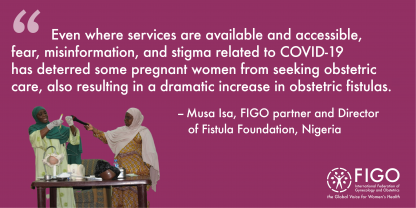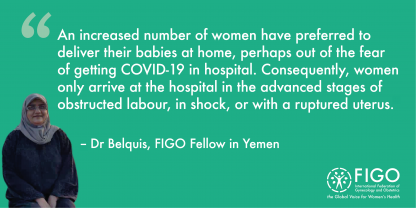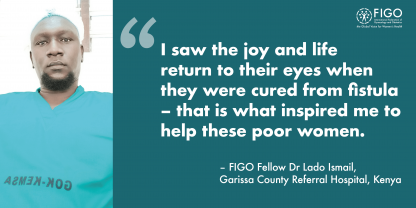Stories from FIGO's Fistula Surgery Trainers – Kenya

Obstetric fistula is a neglected public health and human rights issue and a devastating childbirth injury. It leaves women permanently incontinent, and it is currently estimated that only 1 woman in 50 is able to access corrective treatment.
The FIGO Fistula Surgery Training Initiativeis a globally recognised, pioneering programme offering training and education in fistula surgery. Our 67 trainee surgeons - ‘FIGO Fellows’- provide life-transforming care in some of the world’s most underserved regions, thereby helping to close the fistula treatment gap.
This month, we spoke to FIGO Trainer Dr Hillary Mabeya from Gynocare Women’s and Fistula Hospital in Eldoret, Kenya, (a FIGO Fistula Training Centre) about his experience of being a fistula surgeon and FIGO Trainer, and what it will take to eradicate fistula by 2030.
"Way back in 1997, as a young medical doctor aspiring to become a paediatrician, I was posted to West Pokot, a remote part of Northern Kenya. The suffering of women I saw there – from obstructed labour and fistula, high stillbirth rates, maternal deaths and female genital mutilation – encouraged me to train as an obstetrician/gynaecologist. Once trained as a reproductive health specialist, through many voluntary AMREFoutreaches, I decided to train as a fistula surgeon."
After a short stay at WHO Geneva for a postgraduate training course, I went to the Hamlin Fistula Hospitalin Addis Ababa, Ethiopia, in 2002 for fistula surgery training. From then on, I have performed thousands of fistula surgeries at no cost to the patients and trained many doctors and nurses in fistula care."
"These experiences inspired me to start Gynocare Women’s and Fistula Hospitalin Eldoret, Kenya, in 2011. Our focus is on the surgical repair of obstetric fistulas, and the rehabilitation and reintegration of patients after surgery. Since opening, we have treated more than 5,000 women with fistula. Gynocare offers free treatment because women with obstetric fistula tend to be very poor and unable to afford medical care. We provide comprehensive and holistic care to this marginalised group of patients, despite significant financial constraints."
The devastating impact of the COVID-19 pandemic
"The COVID-19 pandemic has caused extreme challenges to our fistula treatment work. With the start of the pandemic came curfews and lockdowns, and so mothers were not able to make it to hospital. Being a maternity hospital, we saw mothers coming in late with stillbirths, obstructed labour and bad perineal tears because they had attempted to deliver at home."
"Some mothers were afraid to come to the hospital as they feared contracting COVID. When they eventually came, many had very extensive damage and were very sick."
"In times when there has been an easing of lockdown restrictions, many patients have come to the hospital with complex fistulas. The number of fistulas has really increased and this is because of increased home deliveries.In particular, economic difficulties due to job losses have meant that many families are not able to raise the money for women’s travel and delivery at hospital. In addition, hospital visits have been restricted and this has definitely contributed to increased home deliveries."
Being a FIGO Trainer
"I have been honoured to work as a FIGO Trainer since 2014. I have trained many surgeons from different countries, including from areas where there was no fistula surgeon. These surgeons have, in turn, managed to perform many fistula surgeries in their respective home countries."
"The FIGO Training Initiative has reduced the waiting time for patients to receive life-changing fistula surgery. Being a FIGO Trainer has created an immense capacity for me to reach out to many deserving populations."
Eradicating obstetric fistula in 10 years, by 2030
"For us to achieve the eradication of obstetric fistula, we need to put more efforts towards the prevention of fistula through robust, safe maternity care, including increased antenatal clinic attendance, access to a functioning maternity hospital and safe caesarean sections. This will mean advocacy and sensitisation to encourage governments to allocate funds to maternity and safe motherhood, which requires a concerted effort from the international community and governments themselves."
"At the same time, much more work has to be done to reach women with fistula who are in need of surgery and to ensure the proper rehabilitation and reintegration of patients who have had a fistula repair."
23 May marks the annual International Day to End Obstetric Fistula.
Help FIGO to end obstetric fistula by donating to the FIGO Fistula Surgery Initiative, as well as spreading the message on social media using our toolkit.


